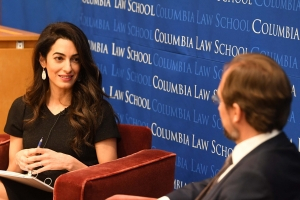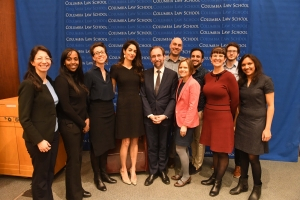UN High Commissioner for Human Rights Zeid Shares Reflections and Advice, in Candid Discussion with Columbia Law Students and Visiting Professor Amal Clooney

New York, April 24, 2018—If Eleanor Roosevelt, who was one of the key drafters of the Universal Declaration of Human Rights, were to be with us today, she would be “horrified” at the fulfillment of the 30 articles of the Universal Declaration of Human Rights on its 70th anniversary this year, said Zeid Ra’ad Al Hussein, the UN High Commissioner for Human Rights, to a packed auditorium of Columbia law students.
Zeid’s office has been bold in “naming and shaming” governments when they violate human rights, according to Visiting Professor Amal Clooney, who moderated the discussion with Columbia students. Zeid noted: “We do not like to use the ‘naming and shaming’ phrase. What we’ve tried to get across is that they have already shamed themselves… and we hold up a mirror to what it is they’re doing.”

Zeid shared with students the difficulties he faces as the top UN official tasked with advancing human rights in the current environment, where human rights are violated frequently. He explained, for example, how he was recently blocked with a procedural vote from presenting on the human rights situation in Syria to the Security Council. “We have 3 percent of the UN budget and are not given the resources we need, [in addition to] dismissiveness, ridicule, and being attacked all the time,” said Zeid.
During the conversation, Zeid and Clooney also discussed the serious problem of the lack of fair trials around the world. “I know we both feel that governments are increasingly using courts as a tool for repression and able to do it quite successfully, unfortunately so far,” said Clooney, who is also a senior fellow at the Law School’s Human Rights Institute. “We’re collaborating on a project now where the UN High Commissioner’s office and my foundation are developing training in international human rights standards so we can have some monitors: people in courtrooms watching trials and reporting on the fairness of trials all over the world.”
Despite the many challenges, Zeid encouraged students to “never underestimate the power of individual agency” in the fight for human rights and shared his vision for a global human rights movement: “The way to secure your own rights, your own future, is to fight for the rights of others.”
Zeid also emphasized the importance of the study of human rights in law schools, and encouraged other schools in the fields of medicine, public health, business, and computer science to similarly start human rights centers.
The event was introduced by Professor Sarah Knuckey, faculty co-director of the Human Rights Institute and Director of the Human Rights Clinic. “I would encourage you to read and listen very closely to the talks that the High Commissioner has given, especially over the past few years, examining rising bigotry, xenophobia, and authoritarian governments,” said Knuckey, “to see what values-based leadership could look like: to have that kind of bravery in the face of authoritarian governments, call out racism by individual leaders, and push forward all of us and lead the UN human rights work from [the basis of] values.”
Organized by the Columbia Law School Human Rights Institute, this event was made possible by generous support of the Mark N. and Helene L. Kaplan Lecture Fund.
# # #
The Human Rights Institute advances international human rights through education, advocacy, fact-finding, research, scholarship, and critical reflection. It works in partnership with advocates, communities, and organizations pushing for social change to develop and strengthen the human rights legal framework and mechanisms, promote justice and accountability for human rights violations, and build and amplify collective power.
Founded in 1998 by the late Professor Louis Henkin as the anchor for human rights within Columbia Law School, the Human Rights Institute promotes engagement and knowledge of human rights within the law school, throughout the University, and around world. Across the many substantive areas of its work, the Institute builds bridges between scholarship and activism, develops capacity within the legal community, engages governments, and models new strategies for progress.
Join us on Facebook: Columbia Law School and Human Rights Institute
Follow us on Twitter: @ColumbiaLaw and @CLSHumanRights
